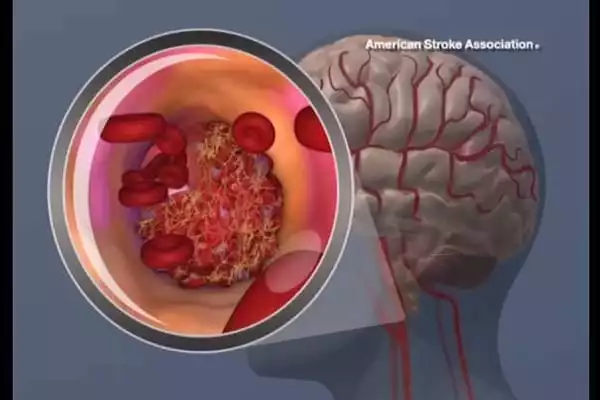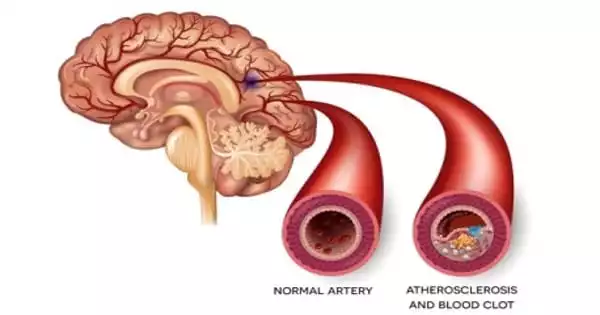A big observational study discovered that heart problems are extremely common within one month of an ischemic stroke (restricted blood flow to the brain). This ‘stroke-heart syndrome’ may increase the chance of death, heart attack, or another stroke in stroke survivors within five years.
According to new research published today in Stroke, the peer-reviewed, flagship journal of the American Stroke Association, a division of the American Heart Association, people who survive an ischemic stroke are much more likely to develop major heart complications during the first month after their stroke, and as a result, they have an increased risk of death, heart attack, or another stroke within five years, compared to people who do not develop heart problems soon after a stroke.
Ischemic stroke is the most frequent type of stroke, accounting for 87 percent of all strokes, and occurs when blood supply to the brain is interrupted. Following a stroke, people frequently experience cardiovascular problems, known as stroke-heart syndrome. Acute coronary syndrome, angina (chest pain), heart rhythm issues such as atrial fibrillation, arrhythmia, and ventricular fibrillation; heart attack; heart failure or Takotsubo syndrome (broken heart syndrome), a type of stress-induced temporary enlargement of a part of the heart that affects its ability to pump effectively. These disorders raise the risk of disability or death in the short term, but the long-term repercussions for patients with stroke-heart syndrome are unknown.
We wanted to know how common newly diagnosed heart complications are after a stroke and, importantly, whether stroke-heart syndrome is associated with increased risk of long-term major adverse events.
Benjamin J.R. Buckley
“We know heart disease and stroke share similar risk factors, and there’s a two-way relationship between the risk of stroke and heart disease. For example, heart conditions such as atrial fibrillation increase the risk of stroke, and stroke also increases the risk of heart conditions,” said Benjamin J.R. Buckley, Ph.D., lead author of the study and a postdoctoral research fellow in preventive cardiology at the Liverpool Centre for Cardiovascular Science, University of Liverpool in the United Kingdom.
“We wanted to know how common newly diagnosed heart complications are after a stroke and, importantly, whether stroke-heart syndrome is associated with increased risk of long-term major adverse events.”
Between 2002 and 2021, researchers examined the medical data of over 365,000 persons treated for ischemic stroke at more than 50 health care facilities, primarily in the United States. People who had stroke-related heart issues within four weeks of having a stroke were matched to an equal number of stroke survivors who did not have these heart complications within four weeks (the control group).

After adjusting for potential confounding factors, such as age, sex and race/ethnicity, and comparing the stroke survivors who had new heart complications to those who did not, the analysis found:
- Approximately one in ten (11.1 percent) of all stroke survivors in the study developed acute coronary syndrome, 8.8 percent were diagnosed with atrial fibrillation, 6.4 percent developed heart failure, 1.2 percent exhibited severe ventricular arrhythmias, and 0.1 percent developed ‘broken heart’ syndrome within four weeks of the stroke.
- The risk of death within five years of a stroke increased significantly among participants who developed new heart complications: 49 percent more likely if they developed acute coronary syndrome, 45 percent more likely if they developed atrial fibrillation/flutter, and 83 percent more likely if they developed heart failure. Severe ventricular arrhythmias increased the chance of death by a factor of two.
- Those who acquired cardiac issues during the one-month interval had a considerably increased chance of hospitalization and heart attack within five years of having a stroke. Stroke survivors who had Takotsubo syndrome were 89% more likely to have a major cardiac event within five years of their stroke.
- People who developed atrial fibrillation after a stroke were 10% more likely to suffer a second stroke within five years. People who had a stroke with newly identified cardiovascular problems were 50% more likely to suffer another stroke within five years of the first.
“I was startled by how frequent stroke-heart syndrome was, as well as the high rate of recurrent stroke in all categories of persons with stroke-heart syndrome,” Buckley said. “This indicates that this is a high-risk demographic on which we should concentrate our secondary prevention efforts.”
The findings of the study extend our understanding of the two-way relationship between the brain and the heart to long-term health outcomes. “We’re doing more research to see if stroke-heart syndrome might be better anticipated,” Buckley added.
“We also need to develop and execute treatments to enhance outcomes for those suffering with stroke-heart syndrome,” Buckley added. “Comprehensive exercise-based rehabilitation, for example, may be useful after a stroke, so it should be beneficial, if not more so, for persons with stroke and newly established heart issues. This is an intriguing subject for further research, in my opinion.”
The study’s weaknesses include the fact that it is a retrospective analysis, and it is unclear if the heart issues discovered after an ischemic stroke were caused by the stroke or contributed to the stroke.





